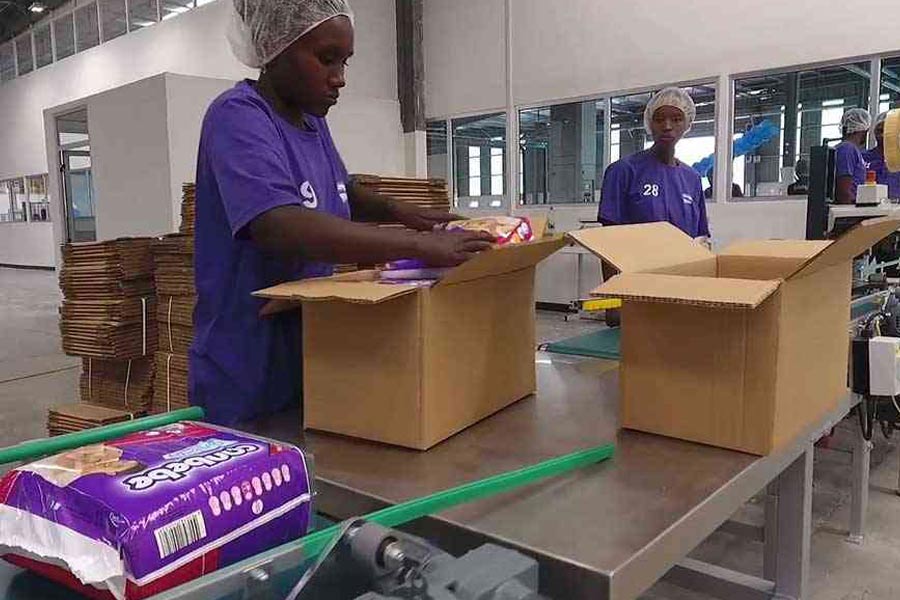
Ethiopia's juice manufacturers confront formidable economic challenges following the reclassification of their products as flavoured beverages, which has led to them being burdened with hundreds of millions of birr in back taxes.
Last year, upon request from the Finance Ministry, the Ethiopian Food & Drug Administration (EFDA) conducted research that concluded all the juice manufacturers in the country were producing flavoured drinks, which entails a 25pc excise tax levy.
The declaration spurred the Ministry of Revenues to seek back taxes and penalties from 10 manufacturers dating back four years, a move that has unsettled the beverage industry subsector already grappling with input shortages.
Temesgen Takele, the Ministry's excise tax liability and audit services coordinator, says they are responsible for collecting taxes on any item deemed taxable by the Finance Ministry.
"We could only go back four years," he told Fortune." Still, only a few have come to report."
Excise taxes were introduced four years ago on items deemed harmful to public health, like sweets, alcohol, and cigarettes, as well as those categorized as a luxury, like bottled water and flavoured drinks.
Abraham Rega, legal advisor at the Ministry of Finance, contends that the manufacturers should have already been paying excise taxes as their products could not be classified as 'juice'.
"There is no way around not paying," he told Fortune.
According to the Institute of Ethiopian Standards(IES), juice production needs to include at least 30pc fruit pulp, a concentrate comprised of both the fibre and juice from fruit processing.
The Association of Ethiopian Beverages Manufacturing Industries has pleaded with the Ministries of Industry, Finance and Revenues to reconsider the reclassification and subsequent excise tax over the past two months.
Ashenafi Merhed, the association's general manager, foresees the imminent closure of the 15 semi-operational factories. Ten have already terminated operations over the few years due to mounting input shortages and lack of access to foreign currency.
"The Authorities are completely misunderstanding it," the general manager told Fortune.
Ashenafi claims that meeting the 30pc requirement is impossible without local pulp manufacturers or sufficient access to foreign currency for imports. He says some manufacturers already use 15pc imported pulp, which he believes should prevent them from being categorized as flavoured drinks.
"There is a serious misconception," Ashenafi says.
Officals from EFDA challenge the notion.
Mulatu Tesfa, head of inspection and legal enforcement at the EFDA, says no 'juice' manufacturer in the country met the minimum requirements to be called such despite the advertisements. He suggested that the manufacturers had intentionally swindled consumers by falsely representing flavoured drinks as juices even though the products did not meet the standards.
"There was an industry-wide false promotion," Mulatu told Fortune.
Nursedin Redwan, general manager of Sendelet Food Processing PLC, says the company might be forced to close its 3,000 Sqm factory in Burayu, Shagaar City if the taxes are not revised.
"Not enough research went into it," he says.
The company, which can produce around 20,000 bottles of the 'O Mango' juice daily, has been importing decreasing volumes of pulp due to a lack of foreign currency.
"We have lost most of our markets," Nursedin told Fortune."The livelihood of 100 employees is at stake".
The Food & Beverage Institute has stepped in to evaluate the amount of nutrition derived from the current pulp requirements to save the fledgling industry.
Medhin Alemu, a researcher from the Institute, says an ongoing study might lead to the revision of the existing pulp requirements. Over the past three years, he has observed over nine manufacturers close down operations due to raw material shortages.
" We are exploring ways to reconcile nutrition standards and pulp requirements," Medhin told Fortune.
He recalls the closure of the country's only pulp manufacturer, africaJUICE Tibla S.C., three years ago as one of the major reasons for the input crunch for manufacturers.
"We are also looking at ways to produce pulp locally," Medhin says.
According to a report by the United Nations Development Program (UNDP), the manufacturing sector's share of the country's GDP dipped by 1.5pc last year, with the closure of 450 factories that went under due to the combination of macroeconomic instability, security issues, and exogenous factors.
African Global Business PLC, manufacturer of the popular flavoured drink 'Bon Juice', is one of these companies as it shut down operations nine months back after eight years in business.
Gashaw Hailemesqel, the company's general manager, says sourcing pulp became increasingly difficult as access to foreign currency seemed to dwindle by the day. He suggests that most other companies produced drinks with even less pulp and sold them at lower prices.
"It was tough to compete," Gashaw told Fortune.
Nutrition experts applaud the government's orientation towards employing stricter regulations over the juice industry.
Hiwot Tadesse, former food inspection director at the EFDA, says the inadequate pulp concentration could harm consumers' health. She explains that most manufacturers would use more artificial sweeteners to compensate for the lost pulp.
"Minimum requirements are the right approach," Hiwot told Fortune.
The expert who currently works at the World Food Program(WFP) says all the benefits of a so-called juice would vanish with the greater infusion of artificial additives. She recommends rigorous research to create a bridge between the manufacturers' complaints and the authorities' requirements.
"Both sides should re-evaluate working practices," Hiwot says
PUBLISHED ON
Apr 20,2024 [ VOL
25 , NO
1251]

Commentaries | Jan 11,2020

Viewpoints | Jan 27,2024

Fortune News | Jan 29,2022

Fortune News | Mar 30,2019

Radar | Jan 31,2021

Fortune News | Dec 30,2023

Fortune News | Jan 12,2019

Radar | Jan 05,2019

Radar | Dec 19,2021

Fortune News | Jun 20,2020

Dec 22 , 2024 . By TIZITA SHEWAFERAW
Charged with transforming colossal state-owned enterprises into modern and competitiv...

Aug 18 , 2024 . By AKSAH ITALO
Although predictable Yonas Zerihun's job in the ride-hailing service is not immune to...

Jul 28 , 2024 . By TIZITA SHEWAFERAW
Unhabitual, perhaps too many, Samuel Gebreyohannes, 38, used to occasionally enjoy a couple of beers at breakfast. However, he recently swit...

Jul 13 , 2024 . By AKSAH ITALO
Investors who rely on tractors, trucks, and field vehicles for commuting, transporting commodities, and f...

Nov 1 , 2025
The National Bank of Ethiopia (NBE) issued a statement two weeks ago that appeared to...

Oct 25 , 2025
The regulatory machinery is on overdrive. In only two years, no fewer than 35 new pro...

Oct 18 , 2025
The political establishment, notably the ruling party and its top brass, has become p...

Oct 11 , 2025
Ladislas Farago, a roving Associated Press (AP) correspondent, arrived in Ethiopia in...